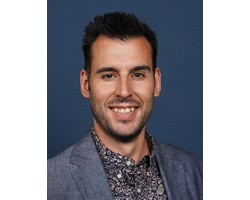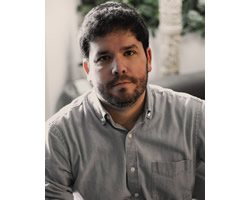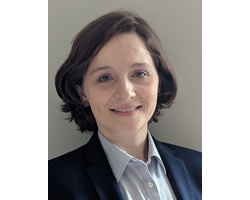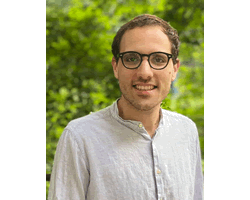
Thomas Bastian, PhD
Assistant Professor
University of Minnesota
Minneapolis, MN
United States
Basic – Thyroid Hormone Development and the Brain
“Adaptive Coupling of Iron & Thyroid Hormone Metabolism in Neurodevelopment”
Dr. Bastian’s research focuses on metabolic interactions among hormones (e.g., thyroid hormone) and micronutrients (e.g., iron) that are directly involved in cellular energy metabolism to understand how these interactions contribute to proper brain development.
Dr. Thomas Bastian is an Assistant Professor in the Department of Pediatrics Neonatology Division at the University of Minnesota. He received his PhD in Integrated Biosciences from the University of Minnesota-Duluth in 2013 and did his postdoctoral training under the mentorship of Drs. Lorene Lanier and Michael Georgieff at the University of Minnesota studying the role of mitochondrial dysfunction in driving the long-term neurobehavioral deficits of fetal-neonatal iron deficiency. Dr. Bastian’s current research focuses on uncovering the cellular/molecular mechanisms by which specific nutrients regulate brain development. This line of research is also clinically relevant as early-life nutrient deficiencies are common, cause abnormal neurodevelopment, and often coexist in humans infants. The Bastian lab has a particular interest in metabolic interactions among micronutrients (e.g., iron, iodine, copper, and zinc) and metabolic regulators (e.g., thyroid hormone), which are directly involved in cellular energy metabolism in the developing brain. Dr. Bastian’s group uses primary neuron and glia culture models and in vivo transgenic approaches to manipulate cellular levels of micronutrients (and other metabolic pathways) in developing brain cells, allowing study of interactions between cellular metabolic processes that are critical for neurodevelopment. The overall goal is to understand how these interactions contribute to proper brain development in order to inform better approaches for clinical management of coexisting nutrient deficiencies during the fetal and neonatal period.

Martyn Bullock, BSc (Hons), PhD
Dr
Kolling Institute
Sydney, NSW, Australia
Basic – Autoimmunity
“Immunoregulatory Functions of Foxe1 in the Adult Mouse Thyroid”
Dr. Bullock’s research focuses on understanding the transcription factor networks that govern thyroid gland development, and how the hijacking of developmental genes contributes to the pathogenesis of adult thyroid disease.
Dr. Martyn Bullock started his scientific career in Wales, where he completed his PhD investigating the role FOXE1 plays in thyroid gland development under the supervision of Prof. Marian Ludgate at Cardiff University. After graduating, Martyn moved to Australia to undertake his postdoctoral work in the laboratory of Prof. Roderick Clifton-Bligh and Prof. Bruce Robinson at the Kolling Institute, University of Sydney, where he studied transcriptional regulation of the TERT in thyroid cancer. He has several first author publications in journals like Thyroid and JCEM and has received multiple awards and fellowships, including a Young Investigator Award from the Asia & Oceania Thyroid Association. His group uses in vivo models and genomic techniques to study the role of transcription factors in regulating thyroid gland morphogenesis, and how the hijacking of developmental transcriptional networks contributes to the pathogenesis of thyroid disease. Recently, he has become interested in how the influence of these factors extends beyond the thyrocyte to modulation of the surrounding immune microenvironment, the subject of this proposal. His career goal is to translate these mechanistic discoveries into novel strategies for preventing or treating autoimmune thyroid diseases.

Iñigo Landa, PhD
Instructor in Medicine
Brigham and Women’s Hospital
Boston, MA
United States
Basic – Thyroid Cancer
“Therapeutic vulnerabilities of telomerase-reactivated thyroid cancers”
Dr. Landa’s research focuses on identifying key genomic events and their underlying mechanisms in thyroid cancer progression, using cell systems, animal models and patients’ samples.
Iñigo Landa, PhD, is a thyroid cancer scientist and an ATA member since 2020. Dr. Landa holds an Associate Scientist position at the Division of Endocrinology, Diabetes and Hypertension at Brigham and Women’s Hospital (BWH), and he is an Instructor in Medicine at Harvard Medical School (HMS) in Boston, MA. He completed his postdoctoral training in Dr. James Fagin lab at Memorial Sloan Kettering Cancer Center (MSKCC) in New York, NY, and his graduate studies in Dr. Mercedes Robledo’s group at the Spanish National Cancer Research Centre (CNIO) in Madrid, Spain. Before that, he got a double BS in Biology and Biochemistry from the Universidad de Navarra (Pamplona, Spain). The main focus of Dr. Landa’s lab is to identify key genetic events and to understand their underlying mechanisms in thyroid cancer progression. He is particularly interested in genomic alterations affecting gene expression. To this end, his lab employs a variety of techniques in pre-clinical cancer cell systems, genetically engineered mice and patients’ samples.

Julio Ricarte Filho, PhD
Research Fellow
Children’s Hospital of Philadelphia
Philadelphia, Pennsylvania
United States
Basic – Medullary Thyroid Cancer
“Integrative Genomic and Transcriptomic Analysis of MEN2B-associated MTC”
Dr. Ricarte Filho’s research focuses on the discovery of genomic alterations in thyroid cancer and evaluation of their clinical significance as diagnostic, prognostic and predictive markers with long term goal of improving patient management.
Julio’s career as a translational cancer scientist has been dedicated to the discovery of genomic alterations in thyroid cancer and evaluation of their clinical significance as diagnostic, prognostic and predictive markers with long term goal of improving patient management. During his PhD and postdoctoral fellowship at James Fagin’s laboratory at Memorial Sloan-Kettering Cancer Center (NY) he was actively involved in pioneering discoveries such as the identification of ETV6-NTRK3 fusion oncogenes in thyroid cancer from children exposed to radiation after the Chernobyl accident as well as activating mutations of AKT1 in advanced metastatic thyroid cancer refractory to RAI. After several years studying thyroid cancer, he transitioned to work for 2 years on methylation markers with diagnostic and prognostic potential in lung cancer liquid biopsies at University of Illinois. In 2020, Dr Aime Franco recruited Julio to her lab based at Children’s Hospital of Philadelphia (CHOP). At CHOP, Julio is committed to translational research projects with the potential to impact the treatment of children with thyroid cancer. His current research is focused on the identification and characterization of somatic alterations underlying pediatric thyroid cancer initiation and progression.

Theodora Pappa, MD, PhD
clinical/research postdoctoral fellow
Brigham and Women’s Hospital
Boston, MA
United States
Basic – Thyroid Cancer
“Dissecting the immune programs driving thyroid cancer progression”
Dr. Pappa’s research focuses on dissecting and clinically interpreting the cellular programs implicated in thyroid cancer.
Dr Pappa is a physician scientist committed to precision medicine in thyroid cancer genomics and aspires to become a leader in computational onco-endocrinology. Her main research focus is to chart the tumor ecosystem in thyroid malignancies and leverage the advances of next generation sequencing and novel computational approaches in order to dissect and clinically interpret thyroid cancer genome. She has conducted multifaceted patient-oriented research in Europe and the US. Her prior experience spans from the clinical spectrum, assessing the impact of endocrine system in cerebrovascular disease and the implications of aldosterone secretion in the pathophysiology of hypertension, to translational science to characterize the genetic defects underlying inherited thyroid disease. Throughout these years, she realized the power of data science to mine big genomic data and answer biologically important questions. With this award, her goal is to dissect the immune programs driving thyroid cancer progression. This project proposed here represents questions with important biological and clinical implications, where she has the skills, tools, experience, data, and guidance to make important discoveries.

Shoko Kure, MD, PhD
Post-doctoral fellow
Beth Israel Deaconess Medical Center, Harvard Medical School
Brookline, MA
United States
Basic – Medullary Thyroid Cancer
“Unraveling pericyte function and lineage in medullary thyroid cancer milieu”
Dr. Kure’s research focuses on assessing the pericyte lineage and functional diversity in the MTC microenvironment. The ultimate goal is to develop novel effective targeted combined therapies for patients with MTC.
Shoko Kure MD/PhD has a background in diagnostic pathology and cytology, molecular and experimental pathology, PhD in Medicine (including skills in molecular and cellular biology, pathology and bioinformatics). She researched thyroid cancer after Chernobyl accident in her medical school. After the clinical residency in Endocrinology and endocrine surgery, she became junior faculty member in the Department of Pathology at Nippon Medical School (Japan), she has researched the molecular profile of the thyroid cancers by analyzing 1,200 cases with 25-year follow-up data, collaborating with Prof. Iwao Sugitani (Department of Endocrine Surgery, Nippon Medical School, Japan), Dr. Mitsuyoshi Hirokawa (Department of Pathology, Kuma Hospital, Japan), and Dr. Kengo Takeuchi (Department of Pathology/Cancer Institute Hospital, Japan), and published several peer-reviewed papers. She worked as a boarded surgical pathologist over the last 5 years, diagnosing thyroid cancer (150 cases/year). She delivered lectures in basic science including thyroid cancer at medical school. She is a co-author of a textbook of pathology. Currently, she is post-doctoral research fellow in Dr. Carmelo Nucera preclinical thyroid cancer research lab (Beth Israel Deaconess Medical Center, Harvard Medical School, Boston, USA). She is studying tumor microenvironment of medullary thyroid cancer by the mentorship of Dr. Carmelo Nucera in his lab spaces. She is a new member of the ATA, declaring that she will dedicate herself to this research for long-term commitment, provide effort and passion to the ATA, and intensely contribute to MTC and other types of thyroid cancer research for new innovative treatment and diagnostic methods.

Alessandro Prete, MD
PhD Student and Research Fellow
Beth Israel Medical Center (BIDMC)/Harvard Medical School
Brookline, MA
United States
Basic – Medullary Thyroid Cancer
Dr. Alessandro Prete is a physician-scientist endocrinologist graduated at the University of Pisa (Italy). He is currently PhD student and research fellow at Beth Israel Medical Center (BIDMC)/Harvard Medical School (HMS) in Boston, mentored by Dr. Carmelo Nucera. Dr. Prete is profoundly committed in translational and clinical thyroid cancer research.
In 2016, he started to gain research skills as an undergraduate medical student during the precious mentorship of Dr. Carmelo Nucera at BIDMC/HMS. He conducted groundbreaking productive research on thyroid cancer focused on mechanisms of resistance to targeted therapies via the crucial role of pericytes in the tumor microenvironment.
Following his medical residency in 2018 at the University of Pisa in the Division of Endocrinology directed from Dr. Rossella Elisei, Dr. Prete became PhD student in 2023. His comprehensive work encompasses all aspects of thyroid cancer patient management, from molecular biology to clinical care. He possesses specialized expertise in treating advanced thyroid cancer patients who have undergone novel therapies using multi-kinase and highly selective inhibitors. Additionally, he serves as a sub-investigator in clinical trials of advanced and progressive thyroid cancers.
Dr. Prete actively participates in professional medical Associations, including the American Thyroid Association (ATA) and European Thyroid Association (ETA). He is also active in journal peer review and teaching activities.
Dr. Prete has been recently awarded from Bite Me Cancer (BMC) and ThyCa at the ATA for a study that is conducted at the BIDMC/Harvard Medical School in the preclinical and translational thyroid cancer research program. The study aims to unraveling pericyte function and lineage in medullary thyroid cancer (MTC) milieu. Dr. Prete will use mouse models of human MTC cells to assess the efficacy of the bimodal treatment with selpercatinib and lenvatinib. This new therapeutic strategy will effectively target both MTC cells and pericytes in the tumor microenvironment. This is the first study to unravel pericyte diversity in MTC and develop a new combined therapy for patients with this lethal thyroid cancer. Assessing pericyte abundance in patients with MTC might be essential for appropriate targeted therapies with tyrosine kinase inhibitors (TKIs).

